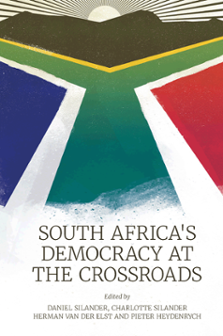
Index
South Africa’s Democracy at the Crossroads
ISBN: 978-1-80262-928-6, eISBN: 978-1-80262-927-9
Publication date: 18 April 2022
Citation
(2022), "Index", Silander, D., Silander, C., van der Elst, H. and Heydenrych, P. (Ed.) South Africa’s Democracy at the Crossroads, Emerald Publishing Limited, Leeds, pp. 199-205. https://doi.org/10.1108/978-1-80262-927-920221015
Publisher
:Emerald Publishing Limited
Copyright © 2022 Daniel Silander, Charlotte Silander, Herman van der Elst and Pieter Heydenrych. Published under exclusive licence by Emerald Publishing Limited
INDEX
- Prelims
- Chapter 1 Democracy at the Crossroads: The Case of South Africa
- Chapter 2 Challenges to Democracy: A Framework of Analysis
- Chapter 3 The Politics of Apartheid in South Africa: 1910–1994
- Chapter 4 Political Society: Challenges and Opportunities for Democratic Consolidation
- Chapter 5 Bureaucratic Society Liberalism and Liberationism: Institutional Compromises and Bureaucratic Management
- Chapter 6 Judicial Society: Constitutionalism and the Rule of Law
- Chapter 7 Economic Society: A Stable Economic Society as a Requirement for Successful Democratic Consolidation
- Chapter 8 Civil Society: Exploring the Democratic Role of Popular Protests
- Chapter 9 Safety and Security Society: Security Infrastructures and Democracy in a Context of Negative Peace
- Chapter 10 Educational Society: Education as Prerequisite for Social Cohesion
- Chapter 11 Sport Society: The Role of Sport and Identity in Democratic Society
- Chapter 12 The International Society: Global and Regional Decline of Democracy
- Chapter 13 Contemporary Challenges to South African Democracy
- Index